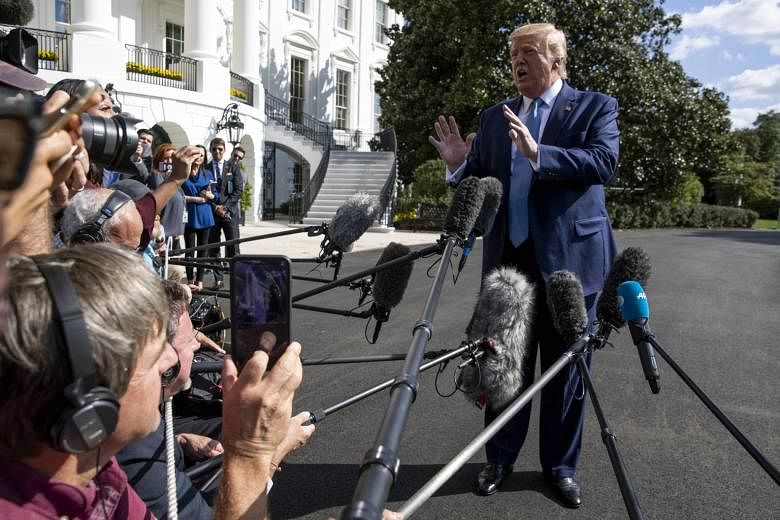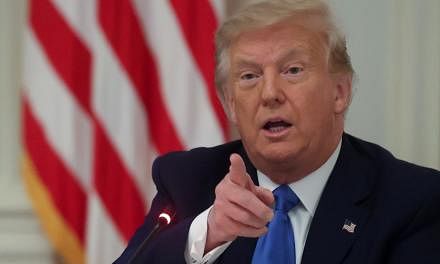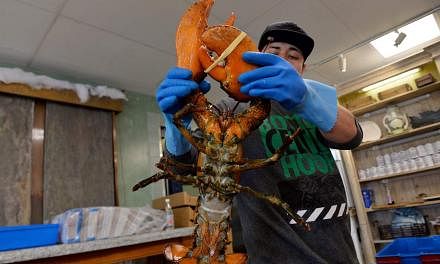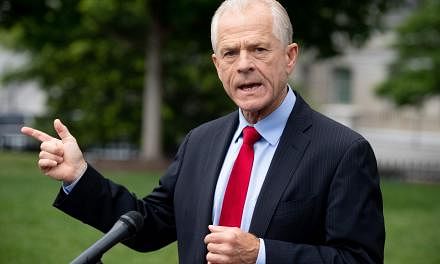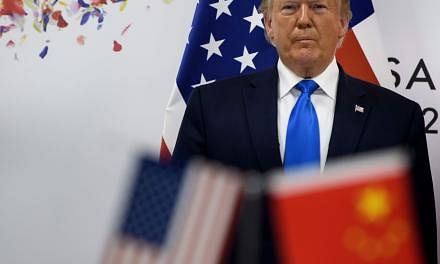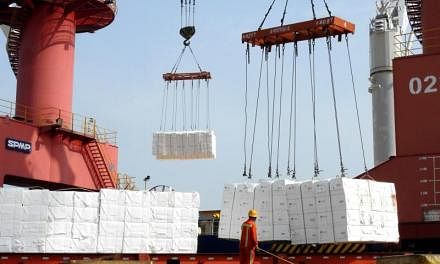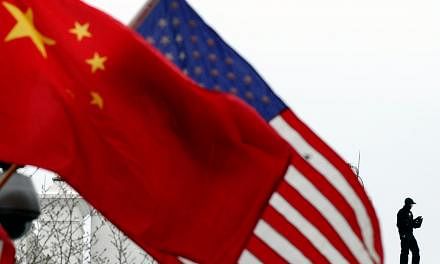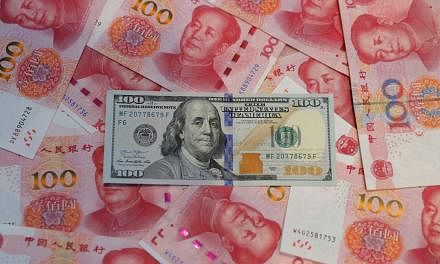WASHINGTON (NYTIMES) - US President Donald Trump's public call for the Chinese government to investigate a political rival could complicate next week's trade talks, which are set to resume on Thursday (Oct 10) when American and Chinese negotiators meet in Washington to see if they can find a path to a trade deal.
Expectations that this round of talks could produce some type of an agreement have been rising amid growing evidence that the trade war is exacting an economic toll on both the United States and China.
Chinese and US officials had been separately charting paths towards easing trade tensions, potentially presaging an initial deal in which the United States agreed to roll back some of its tariffs in return for China strengthening its protections for intellectual property and purchasing American agriculture.
But the president's public urging of China on Thursday to investigate former vice-president Joe Biden and his family will only increase scrutiny of any agreement that Mr Trump may reach with Beijing.
Mr Trump's request came just moments after the president discussed the upcoming trade talks and said that "if they don't do what we want, we have tremendous power".
"The events of the past 24 hours have made it even more difficult for Trump to come to any resolution or any trade deal with China, if it isn't an extraordinary series of concessions from China," Mr Jude Blanchette, a China scholar at the Centre for Strategic and International Studies, said on Friday.
At the negotiating table, officials are likely to still stick to trade issues when a high-level delegation comes to Washington starting on Thursday.
Mr Clete Willems, a partner at Akin Gump who served as a White House economic adviser until earlier this year, said he did not expect the president's comments on Mr Biden to figure in the trade talks.
"Our teams have been very good throughout the negotiating process at keeping unrelated issues out of the talks, and I suspect that will continue," he said.
But the president's comments could change how a trade deal is viewed domestically, on both the right and the left.
Mr Derek Scissors, a resident scholar at the American Enterprise Institute, said Mr Trump had just handed Democrats the "perfect criticism" about his trade deal - that he accepted a lukewarm deal because he wanted the Chinese to help him get dirt on his political enemies.
"Politically, is making a deal a good idea for the president?" Mr Scissors asked. "My reaction is to what he did yesterday is, it just became a bad idea."
A deteriorating situation in Hong Kong further complicates the appearance of striking a deal for the president, who might be criticised for entering into a pact with China at a moment when citizens in Hong Kong are under attack for trying to preserve their autonomy from Beijing.
Mr Trump defended his comments on Friday, saying that striking a deal with China had "nothing to do" with whether the Chinese agreed to investigate the Bidens, and that he would like to strike a deal if the terms were right.
"I'd like to do a great deal with China, but only if it's a great trade deal for this country. One thing has nothing to do with the other," the president said.
Most Republicans have been silent on the president's statement, but several were outspokenly critical of the request, including Senator Mitt Romney of Utah and Senator Ben Sasse of Nebraska.
"If the Biden kid broke laws by selling his name to Beijing, that's a matter for American courts, not communist tyrants running torture camps," Mr Sasse said in a statement to The Omaha World-Herald.
The setback comes at a time when Chinese and US officials appeared to be making progress towards defusing, at least temporarily, a trade war that has been under way for more than a year.
Mr Trump and his advisers have begun looking for ways to find a compromise with China that would forestall another round of tariffs on Chinese goods that are scheduled for later this year, and perhaps roll back some of the existing tariffs, people with knowledge of the White House's strategy said.
The United States has already placed tariffs on more than US$360 billion (S$496 billion) of Chinese products. It plans to raise tariffs on US$250 billion worth of Chinese goods to 30 per cent on Oct 15 and impose more levies in December.
Chinese officials have scaled back their expectations for eliminating US tariffs by quietly dropping earlier public demands that any deal must immediately get rid of all of Trump's levies. They have also resumed buying US farm goods as a goodwill gesture to help establish a negotiating environment in which an initial deal may be possible.
Still, an agreement is far from guaranteed. Both sides have come close to a deal in the past, including in May, only to have it fall apart at the last moment and tip the countries back into an escalating trade war.
Trump and his advisers have insisted they are still pushing for a comprehensive deal that would require Beijing to loosen state control over China's economy.
However, they have also discussed scenarios in which they would ease tariffs on roughly a third of the US$360 billion worth of Chinese goods penalised so far and delay further tariff increases, in return for concessions on intellectual property, substantial agricultural purchases and other benefits, people familiar with the matter said.
It is far from clear whether either Mr Trump or Mr Xi Jinping, his Chinese counterpart, would agree to any interim compromise, or that the two sides' top negotiators could find enough common ground to work towards an initial deal when they meet next week.
Even if they do, the broader trade war would continue to rage, leaving in place US tariffs on at least US$250 billion in Chinese goods, plus some of Beijing's retaliatory measures on US farm products and other imports.
But economic and political pressure is growing on both sides to ease the trade war. China's growth continues to slow, while US farm exports have slumped.
Manufacturing in the United States continues to contract as businesses express concern about the uncertainty posed by the trade fight. Farmers and rural voters largely continue to back Mr Trump, but their support is beginning to waver, and the president is eager to shore up that vote heading into the 2020 campaign.
If China and the United States do not ease tensions before the end of the year, the United States will be taxing nearly every toy, shoe and laptop it receives from China.
The Trump administration has denied that it is considering an "interim deal". But the issue may be one of semantics.
In an interview on CNBC on Tuesday, Mr Wilbur Ross, the Commerce Secretary, said that Mr Trump wanted "a complete deal".
But he also referred to the limited trade pact that the United States signed with Japan last week as "comprehensive". Unlike traditional free trade agreements, which cover dozens of industries and topics, the "mini deal" opens Japanese markets only for two industries - digital trade and agriculture.
Trade experts say it appears unlikely that the United States will have much short-term success getting Beijing to make big changes to how it manages the economy. That means if the Trump administration wants to reach any sort of deal ahead the election, it will have to consider punting on difficult issues.
Chinese officials have also been laying the groundwork for a potential agreement by subtly shifting their stance in recent weeks.
After demanding since early May that any deal include the complete elimination of all tariffs, China has quietly stopped mentioning that point. Senior officials have shifted instead to much broader and more vague statements of their country's goals.
"The two sides should find a solution to the problem through equal dialogue in accordance with the principle of mutual respect, equality and mutual benefit," said Mr Wang Shouwen, China's vice-minister of commerce for North American affairs, at a news conference Sunday.
Internally, Chinese officials have also toned down their expectations on how quickly they can get the Trump administration to lift all tariffs even if the two sides strike a comprehensive deal, said people familiar with Beijing's thinking.
The people, who consult regularly with government officials, were interviewed over the past month and asked for anonymity, citing the diplomatic and financial sensitivities.
